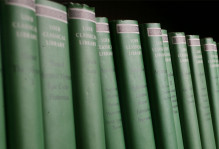I’m not Campbell Brown
All teachers of the social sciences confront a strategic challenge about how to present in class material that has partisan or ideological implications. Take for example the recent decision by Democrats to advance an economic stimulus package in the upcoming lame duck session of Congress. When it eventually surfaces, liberals and Democrats likely will applaud the package as a needed jolt for a sluggish economy. Conservatives and Republicans, on the other hand, will criticize the contents as wasteful (too much pork) and oriented toward paying off Democratic electoral constituencies. As an instructor of American politics and congressional decision making, I probably will need to comment in class on the various titles of the legislation and the nature of the decision making process. Is it feasible or even desirable to present such a topic in a college course without at least touching on the obvious normative content?
This can be a really tough call. I don’t want to make a mountain out of a molehill here. W&M students have good radar for detecting ideological bias in their professors and we are far from their only source of information. Still, nothing can undermine a class more profoundly than student perceptions that the professor is biased and that regurgitating the party line will somehow result in higher grades or strong recommendations.
Surveys and data about campaign contributions indicate that most college faculty at William and Mary and across the nation tend to be liberal Democrats. Needless to say, our students know that most of us tilt to the left and a number of them are understandably concerned about the objectivity of course content. So how can we present ideologically charged topics in class and still maintain a constructive atmosphere of fairness and objectivity? For what they are worth, here are a few thoughts.
First, one useful tactic is to regularly hose down politicians of all stripes, that is, to be an “equal opportunity” ridiculer. With this approach, the instructor simply goes out of his or her way to make fun of all major political parties and points of view. For example, if I make light of a recent gaffe by Sarah Palin, or of President Bush’s often tortured use of the English language, I make sure to follow up shortly with observations about the media’s tendency to genuflect in the general direction of Barack Obama. Hopefully, the unstated message to my students is that there is much to laugh about – and to criticize – on both sides of the partisan aisle.
Second, professors and students need to stay focused on the scientific method. Social science is not journalism and the answers to all political and policy questions are not a matter of opinion. Ideally, the assertions we make about the social world should be grounded in theory. We should teach our students to begin with reasonable assumptions about people’s motivations and incentives, then reason in a logical fashion about the implications of these assumptions, and thereby derive assertions – called hypotheses – about important real-world political and policy matters. Then we – and they – should do our best to consider relevant evidence and evaluate whether this evidence supports or contradicts the aforementioned assertions, which in turn will reinforce or undermine our confidence in the underlying theory. Notice that nothing about this process for presenting and evaluating political information is inherently ideological or partisan, even if the results may make one political party look better than the other. As much as possible, class lectures and discussions should track the objective and powerful logic of the scientific method.
Third, college instructors of politics and the other social sciences need to emphasize that it is actually possible to know things that matter about social behavior and public policy. I feel really strongly about this point. Too many of our students have been saturated with the “CNN” approach to exploring controversial topics and they think that all political or policy information is nothing more than spin. They believe that all points of view are inherently biased and that the only way to guarantee a degree of balance is to consider the opposing sides and split the difference. Listen carefully to the left-wing windbag and the right wing nut and the truth will somehow emerge.
Ugh! In my view, some assertions about the social world are simply accurate, even if they seem to advantage one party or ideological point of view. Every meaningful statement about politics or public policy is not spin, inherently subjective, or purely a matter of opinion. For example, last month Professor Larry Bartels of Princeton University presented the argument in his new book, Unequal Democracy: The Political Economy of the New Guilded Age, to an audience of over 200 faculty and students in Tucker Hall at W&M. It was a great session. Among other points, Bartels demonstrated that income growth for poor and middle class people tends to be higher under Democratic presidents than under GOP administrations. The observation was backed up by systematic data from widely accepted sources. Democrats may like the result more than do Republicans, but that doesn’t mean the finding is any less true or important. Similarly, back in the 1980s a number of prominent sociologists demonstrated that the welfare programs of the day created some unintended and unfortunate incentives for poor teenagers to have children out of wedlock. Liberals were uncomfortable about the assertion, but it was still amply supported by data and thus needed to be taken seriously.
The bottom line? In my view college professors should be very careful that their personal political views do not shape, color, or otherwise distort their presentation of course material in the classroom, and even during more informal exchanges with students outside of class. At the same time, though, we also need to steer clear of obsessive attempts to always present both sides of an issue. In the end, the scientific method and our professional training, hopefully leavened by common sense and a little bit of humor, provides the critical guidance for evaluating evidence about controversial topics. The best way to ensure political objectivity in class, in other words, is to teach our students to think like scholars. “No bias, no bull.”




No comments.
Comments are currently closed. Comments are closed on all posts older than one year, and for those in our archive.